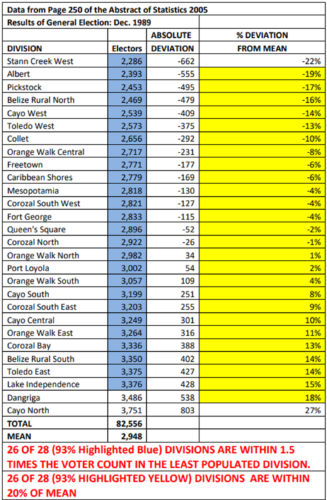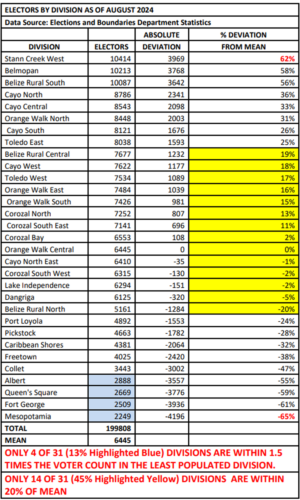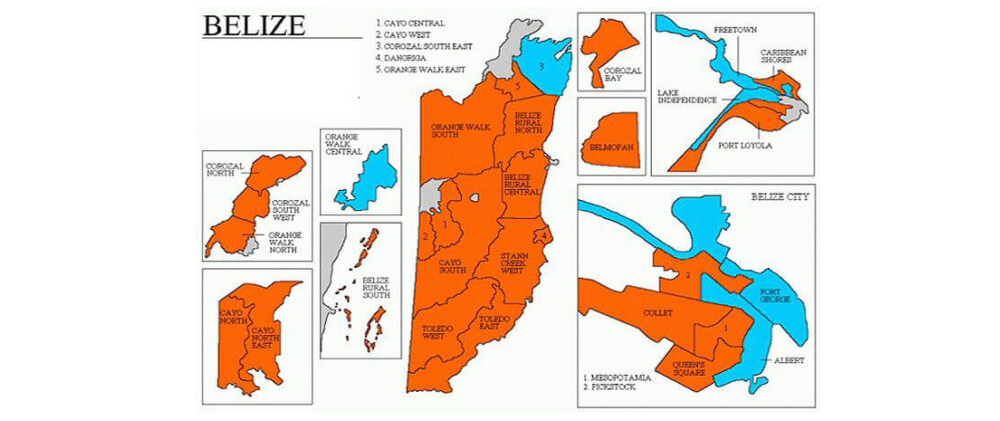by William Ysaguirre
BELIZE CITY, Thurs. Dec. 12, 2024
Belize’s electoral districts are very disproportionate in the number of registered voters in each district, with the largest, Stann Creek West with 10,446 voters, having 3 to 4 times as many voters as the smallest divisions in Belize City, where the Albert Division has only 2,888 voters, and Mesopotamia has 2,249 voters. This differs far from the proportionate representation envisioned by Section 90 of the Belize Constitution, which called for the electoral divisions to be as nearly equal as possible, and for the most populous division to not exceed the smallest division by more than 50 percent.
The Belize Peace Movement has filed a claim for a Constitutional challenge of this state of affairs before the High Court of Belize, naming the Elections and Boundaries Commission and the Attorney General of Belize as the respondents. The claimants named in the action are Rudy Lewinskey Wade, Hubert Dennis Enriquez, Paul Marcel Morgan, William Maheia, Godwin Bernard Sutherland, Antonio Giovanni De La Fuente and Roberto Antonio Lopez. All of the claimants live and are registered voters in some of the most populous constituencies: Enriquez and Morgan in Belmopan which has 10,213 voters, Lopez in Belize Rural South which has 10,087 voters, Wade in Cayo Central – 8,543 voters, Sutherland in Cayo North – 8,786 voters, Maheia in Toledo East – 8,038 voters, and De La Fuente in Orange Walk East – 7,484 voters.

They are calling on the Courts to order the Elections and Boundaries Commission to conduct a re-districting exercise, and to hold off on conducting any General Elections, until the electoral rolls can be more balanced. They are asking the court to rule that the voters’ list violates the Constitution as it now stands, and for the court to award them costs for having to bring this matter to the court to have the situation addressed, to force the Elections Commission to do its job correctly.

The government, for its part, has given the claimants notice of “challenge accepted”, with some very high-priced legal beagles throwing down the gauntlet. On Monday, Senior Counsel Eamon Courtenay advised the claimants’ attorney, Sharon Pitts, that the law firm Courtenay and Coye would be representing the Attorney General. Former Attorney General Godfrey Smith will be representing the Elections and Boundaries Commission.
Most attorneys turned down the case as a lost cause not worth pursuing, claimant Wil Maheia explained, and he was happy that Sharon Pitts had agreed to take on the case, not entirely pro bono, but not at any exorbitant cost, and within the claimants’ budget, certainly not as much as the government’s high prices attorneys. He was not certain of when their case would get its first hearing, perhaps in mid-January next year.
“We just want the elections to be fair, and for Belize to have truly democratic elections,” Maheia said. The claimants simply want for each citizen’s vote to have equal weight, whereas presently the voters in the smaller constituencies seem to get better representation, as their vote carries more weight. The geographic size of the larger constituencies also makes it more difficult for the elected representatives to reach all his constituents to hear the voice of the people, so that he can best represent their wishes.
Maheia did not suggest how the Elections Commission should carry out its task, but lamented that presently the populous districts south of the Sibun only have 4 representatives in the House, while the smallest constituencies in Belize City each have a representative. The Constitution did not envision increasing the number of seats in the House, but Toledo East and West would each need to have 3 or 4 representatives to achieve parity with the Mesopotamia division, and the same would be true of Stann Creek West, Belize Rural South and Belmopan.

